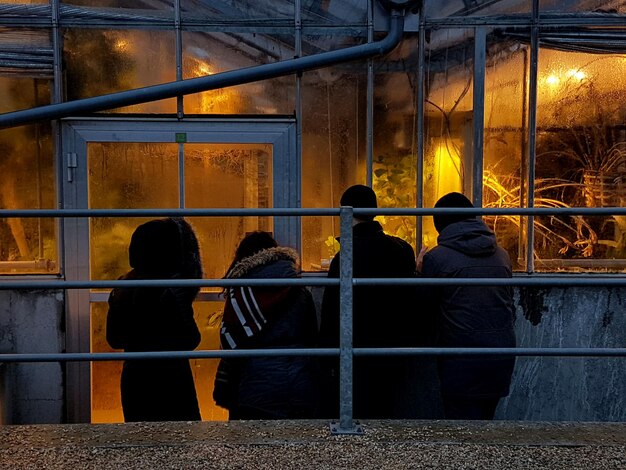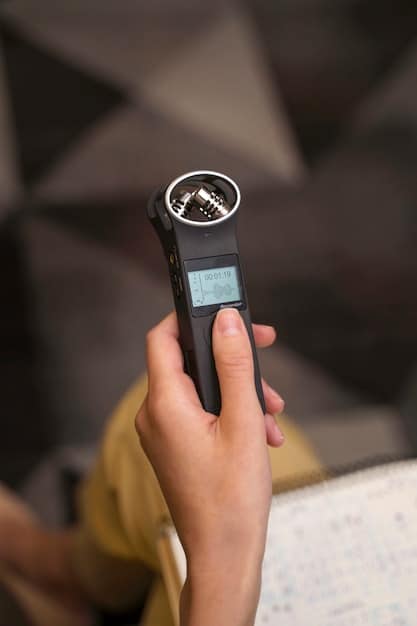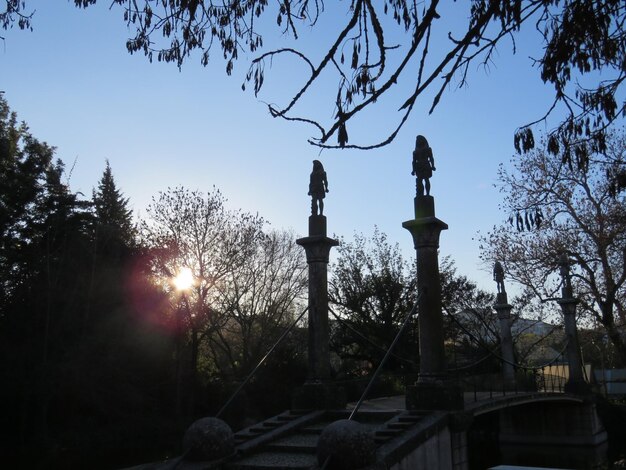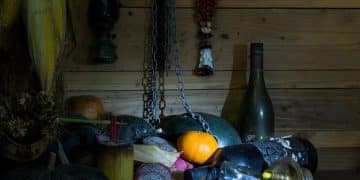The Psychology Behind Ghost Hunting: Why We Seek Paranormal Experiences

The psychology of ghost hunting delves into the compelling reasons behind why individuals actively seek out paranormal experiences, exploring the human fascination with the unknown and the potential psychological benefits derived from engaging with the supernatural.
Why do so many people spend their time, energy, and money chasing after ghosts? The answer, as it turns out, is deeply rooted in the human psyche. This article explores **the psychology of ghost hunting: why do people seek out paranormal experiences?**
The Allure of the Unknown
The fascination with the unknown is a fundamental aspect of human nature. Throughout history, people have been drawn to mysteries, seeking to understand what lies beyond the realm of ordinary experience. This inherent curiosity plays a significant role in the appeal of ghost hunting.
The paranormal represents a frontier of knowledge, a space where the rules of the physical world seem to bend or break. For some, exploring this frontier is a way to test the limits of their understanding and to encounter something truly extraordinary.
The Appeal of Mystery
One of the primary drivers behind the pursuit of paranormal experiences is the inherent human attraction to mystery. Unexplained phenomena, such as ghostly apparitions and unexplained noises, pique our curiosity and challenge our perceptions of reality.
Seeking Answers
Ghost hunting provides a framework for seeking answers to these mysteries, even if the answers are elusive. The act of investigating, documenting, and analyzing potential evidence of paranormal activity can be a deeply engaging and intellectually stimulating process.

- The thrill of uncovering something new.
- The challenge of deciphering the unknown.
- The potential for expanding our understanding of the universe.
Ultimately, the allure of the unknown is a powerful motivator for those who venture into the world of ghost hunting. It represents a desire to push boundaries, explore uncharted territory, and grapple with the fundamental questions of existence.
The Search for Meaning and Purpose
Beyond the thrill of the chase, ghost hunting can also provide a sense of meaning and purpose. For individuals seeking deeper connections and a greater understanding of their place in the world, the paranormal can offer a unique avenue for exploration.
The belief in an afterlife, or the possibility of communicating with spirits, can be a source of comfort and hope for those grappling with grief, loss, or existential questions. Ghost hunting can provide a framework for exploring these beliefs and seeking answers to some of life’s most profound questions.
Coping with Grief
For many, the loss of a loved one can be a deeply traumatic experience. Ghost hunting can offer a means of coping with grief by providing a sense of connection to the deceased or a belief in the possibility of continued existence.
Finding Community
Ghost hunting can also foster a sense of community among like-minded individuals. Sharing experiences, exchanging theories, and working together to investigate paranormal phenomena can create strong bonds and a sense of belonging.
- Providing a sense of closure after loss.
- Offering a framework for belief and spirituality.
- Creating social connections with others.
In essence, the search for meaning and purpose through ghost hunting reflects a deeper human need to connect with something larger than oneself, to find comfort in the face of uncertainty, and to forge meaningful relationships with others.

The Role of Suggestibility and Belief
The psychology of ghost hunting is significantly influenced by suggestibility and pre-existing beliefs. What people believe about the paranormal can heavily shape their experiences. This is not to dismiss all experiences as imagined, but rather to acknowledge how interpretation plays a key role.
Individuals with strong beliefs in the paranormal are more likely to interpret ambiguous sensory information, such as creaks or shadows, as evidence of ghostly activity. This is due to a psychological phenomenon known as confirmation bias, where people tend to seek out and interpret information that confirms their existing beliefs.
Confirmation Bias
Confirmation bias is a tendency to favor information that aligns with our pre-existing beliefs, while downplaying or ignoring information that contradicts them. In the context of ghost hunting, this can lead individuals to selectively perceive and interpret events in a way that supports their belief in the paranormal.
The Power of Suggestion
Suggestibility also plays a significant role, where the power of suggestion can shape perceptions and experiences. If someone is told that a particular location is haunted, they may be more likely to experience unusual sensations or interpret normal events as paranormal activity.
- How beliefs can shape experiences.
- The impact of confirmation bias on interpretation.
- The significant role of suggestion in paranormal investigations.
Therefore, it’s important for ghost hunters to approach their investigations with a critical and objective mindset, being mindful of the potential influence of suggestibility and belief on their perceptions.
The Impact of Group Dynamics
The social aspect of ghost hunting, especially when conducted in groups, introduces another layer of psychological complexity. Groupthink, the desire for social cohesion, and other group dynamics can significantly impact experiences and interpretations of events.
In a group setting, individuals may be more likely to conform to the opinions and beliefs of others, even if they privately harbor doubts. This can lead to a shared belief in the paranormal, even when the evidence is ambiguous or inconclusive.
Groupthink
Groupthink is a psychological phenomenon that occurs when a group of people prioritize harmony and conformity over critical thinking and independent evaluation. In the context of ghost hunting, groupthink can lead to a shared belief in the paranormal, even when the evidence is weak or questionable.
Social Influence
Social influence also plays a crucial role in shaping individual experiences within a group. The desire to fit in and be accepted by others can lead individuals to adopt the beliefs and behaviors of the group, even if they contradict their own personal experiences.
- The phenomenon of groupthink in paranormal investigations.
- How social influence shapes individual experience in groups.
- The balance between shared experience and critical thought.
Understanding these dynamics is critical in mitigating potential biases and ensuring a more objective approach to investigations.
The Thrill of the Hunt
For many enthusiasts, ghost hunting is not solely about proving or disproving paranormal phenomena; it’s also about the excitement and adventure involved in the pursuit. This thrill is an emotional response to the anticipation and mystery of the unknown.
This sense of adventure can be particularly appealing in environments that are otherwise mundane or routine. It offers a break from the ordinary and a chance to experience something extraordinary, even if the outcome is uncertain.
The Adrenaline Rush
The possibility of encountering something truly otherworldly provides an adrenaline rush that can be highly addictive for some. This physiological response is similar to the excitement experienced in other high-stakes activities.
Exploring New Environments
Ghost hunting often involves visiting abandoned buildings, historic sites, and other mysterious locations. This provides an opportunity to explore new environments and learn about the history and lore associated with these places.
- The thrill and excitement associated with ghost hunting.
- The adrenaline rush of potentially confronting the unknown.
- The joy of exploration in abandoned or historic locations.
Whether it’s the rush of entering a dark, unknown space or the satisfaction of uncovering a piece of hidden history, the thrill of the hunt is a significant factor in the enduring appeal of ghost hunting.
Distinguishing Science from Pseudoscience
A key aspect of exploring the psychology of ghost hunting: why do people seek out paranormal experiences? involves delineating between genuine scientific inquiry and what might be considered pseudoscience. The methods and approaches employed by ghost hunters vary widely.
While some groups use scientific instruments and rigorous methodologies to collect and analyze data, others rely more on intuition, personal experiences, and anecdotal evidence. Understanding the difference between these approaches is crucial for evaluating the validity of claims and findings.
The Scientific Approach
A scientific approach to ghost hunting involves formulating testable hypotheses, collecting data through controlled experiments, and analyzing the results using statistical methods. This approach prioritizes objectivity and seeks to minimize the influence of subjective beliefs and biases.
The Pseudoscience Approach
In contrast, a pseudoscientific approach often relies on anecdotal evidence, personal testimonials, and subjective interpretations. This approach may lack rigorous controls and may not be subject to peer review or independent verification.
- Key features of a scientific approach versus pseudoscience.
- The balance of empirical evidence with intuitive interpretations.
- Critically evaluating methods used in paranormal investigations.
It is essential to critically evaluate the methods and evidence presented by ghost hunting groups to determine whether their claims are supported by sound scientific principles or based on unsubstantiated beliefs.
The Future of Paranormal Investigation
As technology advances and our understanding of the human brain deepens, the field of paranormal investigation is likely to evolve. New tools and techniques may emerge that allow for more objective and reliable measurements of paranormal phenomena. However, the core psychological motivations that drive people to seek out these experiences will likely remain constant.
The ongoing quest to understand the unknown, to find meaning and purpose in life, and to connect with something larger than ourselves will continue to fuel the fascination with ghosts and the paranormal for generations to come.
Technological Advances
Advancements in sensor technology, data analysis, and virtual reality may revolutionize the way paranormal investigations are conducted. These technologies could provide more precise and objective measurements of environmental factors, as well as create immersive and controlled environments for studying paranormal phenomena.
Psychological Insights
Further research into the psychology of perception, belief, and suggestibility may shed light on the complex interplay between the human mind and paranormal experiences. This could lead to a better understanding of why some people are more prone to experiencing paranormal phenomena and how these experiences can be interpreted.
- Potential technologies that may shape investigation.
- The importance of psychology in interpreting experiences.
- Enduring human fascination with the supernatural.
In conclusion, while the methods of paranormal investigation may evolve, the fundamental human desire to explore the mysteries of the universe and connect with the unknown will continue to drive the field forward.
| Key Point | Brief Description |
|---|---|
| 👻 Allure of the Unknown | Humans are naturally drawn to mysteries and unexplained phenomena. |
| 🫂 Search for Meaning | Ghost hunting can provide comfort and a sense of purpose, especially after loss. |
| 🧠 Belief and Suggestibility | Pre-existing beliefs and suggestion can shape paranormal experiences. |
| 🤝 Group Dynamics | Group dynamics like groupthink can influence the interpretation of events. |
Frequently Asked Questions
▼
People are fascinated by ghosts due to the allure of the unknown, the mystery surrounding death, and the possibility of an afterlife. It taps into inherent human curiosity.
▼
Yes, ghost hunting can help some individuals cope with grief by offering a sense of connection to deceased loved ones or a belief in their continued existence, providing closure and peace.
▼
Beliefs can significantly influence paranormal experiences. Individuals with strong beliefs in the paranormal are more likely to interpret ambiguous sensory data as evidence, emphasizing the power of perception.
▼
Technology is used to detect anomalies and gather data. EMF meters, thermal cameras, and audio recorders are frequently utilized to try and capture evidence of paranormal activity objectively.
▼
Ghost hunting can be approached from both scientific and pseudoscientific perspectives. A scientific approach involves hypothesis testing, empirical data, and statistical analysis, whereas the pseudoscientific approach lacks rigor.
Conclusion
The exploration of the psychology behind ghost hunting reveals a complex interplay of curiosity, belief, grief, and the inherent human desire to understand the unknown. Whether driven by a quest for scientific validation or a personal search for meaning, the pursuit of paranormal experiences continues to captivate and intrigue.





